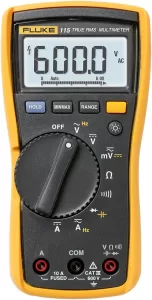
Multimeter Essentials: Unveiling the Secrets of This Versatile Tool
November 30 2023 
Inquiry
Global electronic component supplier AMPHEO PTY LTD: Rich inventory for one-stop shopping. Inquire easily, and receive fast, customized solutions and quotes.
QUICK RFQ
ADD TO RFQ LIST
Within the fields of electronics and electrical engineering, the multimeter is a vital instrument, a flexible partner that enables people with varying degrees of expertise to handle the complexities of electrical measurements. The multimeter is a dependable tool for those who are new to or experienced in the electrical field, as it can provide insight into the mysterious world of electrical work. In this blog, we will delve into the world of multimeters, unraveling their secrets and equipping you with the knowledge to confidently wield this versatile tool. From its historical origins to its intricate workings, we'll explore the multimeter's capabilities, unravel the mysteries of electrical measurements, and address common queries that arise when embarking on this electrifying journey.
What is Multimeters?
Fundamentally, a multimeter is a multipurpose measuring device that combines the capabilities of multiple specialized tools into a single, small package. It functions as a multipurpose investigator, deftly and deftly examining a variety of electrical characteristics. The multimeter is a devoted friend that can help you unravel the mysteries of the electrical world, regardless of your level of experience as an electrician or your curiosity as a hobbyist. A typical multimeter comprises three primary functions:- Voltmeter: This device calculates the voltage, or electrical potential difference, between two circuit points.
- Ammeter: Current, or the rate at which electrons flow through a conductor, is measured by an ammeter.
- Ohmmeter: Opposition to the flow of electrical current is measured by an ohmmeter.

When were Multimeters Invented?
The journey of the multimeter started in the 1920s with the introduction of the first crude models that combined the capabilities of an ohmmeter, voltmeter, and ammeter into one device. These early explorers cleared the path for the contemporary multimeters we are familiar with today—instruments that are now carried by a vast number of people as necessary tools.How Multimeters Work?
A multimeter's internal operations are just as complex as the measurements it collects. A galvanometer, a sensitive instrument that senses and reacts to electrical currents, is at the center of the system. The multimeter can easily switch between measuring voltage, current, and resistance thanks to the galvanometer's clever coupling with different resistors and voltage dividers.How Multimeter measures voltage?
A multimeter in voltmeter mode is used to measure voltage. When the multimeter is in voltmeter mode, it is connected in parallel to the circuit or component that needs to be measured. This indicates that the multimeter does not consume any current from the circuit and that its presence has no effect on the voltage reading. Voltmeters come in two primary varieties: analog and digital. Digital voltmeters show the voltage reading on a screen, whereas analog voltmeters indicate the voltage reading with a needle. Compared to analog voltmeters, digital voltmeters are typically easier to read and more accurate. To measure voltage with a multimeter, follow these steps:- Select the voltmeter mode on the multimeter.
- Attach the black probe to the circuit's or component's negative terminal for measurement.
- Attach the red probe to the circuit's or component's positive terminal for measurement.
- Check the voltage reading on the multimeter's display.
Video related to How to Use a Multimeter
Are Multimeters Required to be Calibrated?
An accurate measurement is guaranteed by calibration for a multimeter over time. For professionals whose measurements must be exact, routine calibration is strongly advised, though it is not required for all users. The multimeter's readings are compared to a recognized standard during calibration to make sure the measurements match industry standards.Can Multimeters be Repaired?
Like any electrical equipment, multimeters can break or malfunction. But they can last for many years if handled carefully and given the right care. In the event of a malfunction, straightforward fixes like changing a blown fuse or cleaning internal parts might be achievable. It is advisable to seek professional repair services for more complex issues.How Long Do Multimeters Last?
A multimeter's lifespan is influenced by a number of variables, such as how often it is used, the environment it is in, and proper maintenance. A high-quality multimeter can last for several years or even decades under normal usage conditions. However, there are a number of things that can drastically shorten its life, like physical damage, exposure to high humidity, or extreme temperatures.Where Are Multimeters Used?
Multimeters are widely used in many different fields, such as electronics, electrical engineering, home maintenance, and automotive repair. They enable users to optimize, fix, and troubleshoot a wide range of electrical devices, from sophisticated industrial machinery to domestic appliances. Here are some specific examples of how multimeters are used in various fields:- Electronics and Electrical Engineering: Multimeters are crucial tools for the design, testing, and troubleshooting of electronic circuits in the fields of electrical and electronic engineering. They give engineers the ability to measure resistance, voltage, and current, which is essential for understanding how circuits behave and spotting possible problems.
- Automotive Repair: When it comes to identifying and fixing automotive electrical systems, multimeters are invaluable. They make it possible for mechanics to test starters, alternators, batteries, and other electrical parts to make sure the car's electrical system is operating correctly.
- Home Maintenance: To troubleshoot and repair household appliances like toasters, ovens, and light fixtures, homeowners can use multimeters as useful tools. They can also be used to detect possible wiring problems and measure the voltage in household outlets.
- Science Education: By enabling students to conduct experiments and obtain practical experience with electrical measurements, multimeters are invaluable tools for science education. They can be used to investigate ideas like Kirchhoff's laws, Ohm's law, and circuit behavior.
How Accurate Are Multimeters?
A multimeter's accuracy is contingent upon various factors, such as its specifications, calibration state, and method of measurement. Remarkable accuracy levels can be reached by high-quality multimeters, frequently within a fraction of a percent of the measured value. It's crucial to remember, though, that elements like humidity, temperature, and the existence of errant electromagnetic fields can all have an impact on accuracy. It's essential to use a high-quality multimeter, maintain proper calibration, and adhere to proper measurement techniques in order to ensure accurate measurements. For precise usage and calibration instructions, always refer to the multimeter's handbook.What Multimeter Setting for Car Battery?
To test a car battery, turn the multimeter to the DC volts range (most multimeters have a 20V setting). A car battery's voltage, which normally ranges from 12 to 13 volts when fully charged, can be measured within this range. Here's a step-by-step guide on how to test a car battery with a multimeter:- Aim the multimeter for the 20V setting in the DC volts range.
- Switch off any accessories that might be consuming electricity, including the headlights on the car.
- To let the battery's surface charge fade, give it a couple of minutes.
- Attach the black probe of the multimeter to the negative (-) terminal and the red probe to the battery's positive (+) terminal.
- Check the multimeter's reading. A car battery that has been fully charged should show between 12.6 and 13 volts.
- If the voltage reading is significantly lower than 12 volts, the battery may be discharged or need replacement.
Conclusion
Multimeters are indispensable tools for anyone working with electronics or electrical systems. They are beneficial tools for professionals and enthusiasts alike due to their adaptability and simplicity of use. Users can use the multimeter's power to troubleshoot, repair, and optimize a wide range of electrical devices by learning the fundamentals of multimeter operation and adhering to the necessary safety precautions. What is MultimetersWhen were Multimeters InventedHow Multimeters WorkHow Multimeter measures voltageVideo related to How to Use a MultimeterAre Multimeters Required to be CalibratedCan Multimeters be RepairedHow Long Do Multimeters LastWhere Are Multimeters UsedHow Accurate Are MultimetersWhat Multimeter Setting for Car BatteryConclusion
Related Articles
- ·Stratix 10 VS Stratix V: Which FPGA is Right for Your Next Project?
- ·Intel Xeon Platinum 8454H vs AMD EPYC: Which Reigns Supreme?
- ·A Deep Dive into the AMD EPYC 4564P Processor
- ·MSP430F5438A vs MSP430F5529: A Detailed Analysis of Their Capabilities
- ·Comparing MSP430F6659 and MSP430F5419A: Which One is Right for Your Project?
- ·Exploring the Features of MSP430F5529 and MSP430F5638 Microcontrollers
- ·Demystifying 20 Microcontroller Projects for Beginners
- ·Unveiling the Ultimate Guide to Microcontroller Programming
- ·4680 Battery: Unveiling the Power Potential of the Next-Gen Cell
- ·Exploring the Case Studies on Arduino Applications
Populer Posts
